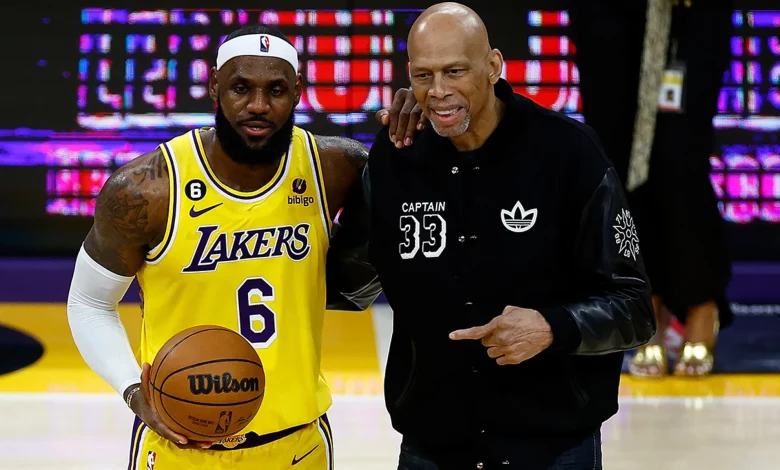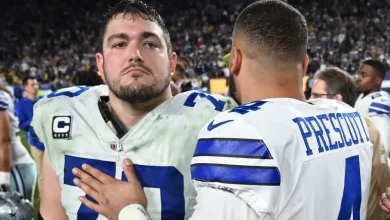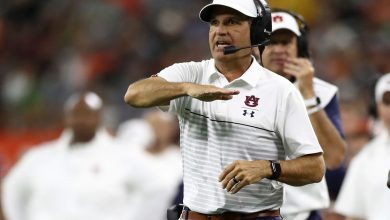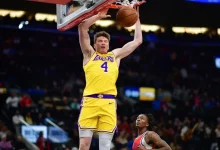Three-time NBA champion James Worthy stated LeBron James isn’t yet eligible for a Lakers statue, citing the need for longevity.

In the world of professional sports, the notion of immortalizing a player’s legacy through the construction of a statue is a significant one. Statues are not just physical representations of a player; they are symbols of greatness, achievements, and the indelible mark a player leaves on their team and city. The Los Angeles Lakers, one of the most storied franchises in the NBA, has honored a few of their legendary players with statues outside the Staples Center (now Crypto.com Arena), including Magic Johnson, Kareem Abdul-Jabbar, and Shaquille O’Neal. However, as LeBron James has firmly established himself as one of the greatest players in the league’s history and a critical part of the Lakers’ modern-day success, a significant question has arisen: does LeBron James deserve a statue outside the arena?
James Worthy, a three-time NBA champion and Hall of Famer, recently made comments that reignited the debate regarding LeBron’s eligibility for a statue. Worthy, a Lakers legend in his own right, stated that while LeBron’s achievements with the team are undeniable, he believes the superstar forward has not been with the Lakers long enough to earn such an honor. This remark has sparked discussion across the NBA fanbase, with many supporting Worthy’s perspective while others argue that LeBron’s accomplishments in a relatively short time with the Lakers already justify his statue.
In this article, we will explore the essence of James Worthy’s comment, the context surrounding LeBron James’ time with the Lakers, the importance of longevity in the team’s history, and whether or not LeBron James deserves a statue outside the arena.
James Worthy’s Perspective: Longevity Over Instant Impact
James Worthy is no stranger to the Los Angeles Lakers’ legacy. Worthy was drafted by the Lakers in 1982 and spent his entire 12-season career with the team, winning three NBA championships (1985, 1987, and 1988) and earning a Finals MVP award in 1988. He was known for his consistent excellence and his vital contributions to the Lakers’ iconic “Showtime” era, which was powered by Magic Johnson’s leadership and Kareem Abdul-Jabbar’s dominance. Worthy’s perspective on LeBron James, therefore, is rooted in his own deep understanding of what it means to be a Lakers legend.
When Worthy made his comments about LeBron James not yet being eligible for a statue, he wasn’t dismissing LeBron’s importance or impact on the franchise. Instead, he was emphasizing the value of time, consistency, and the need for prolonged contributions to the team’s legacy. “Longevity matters,” Worthy said. He suggested that while LeBron has certainly accomplished remarkable things during his relatively short stint with the Lakers, it is important to have sustained success with the franchise before earning such a high honor as a statue.
Worthy’s point centers around the idea that a statue should not only commemorate a player’s achievements but should also be reserved for those who have shaped the identity of the team over an extended period. Worthy himself was part of the Lakers for more than a decade and contributed to their successes during the 1980s and early 1990s. In this sense, he is arguing that a player’s impact on the team should extend beyond isolated victories and singular accomplishments; it should encompass a body of work that defines the team’s success over a significant portion of their career.
In Worthy’s eyes, LeBron’s tenure with the Lakers—though undoubtedly successful—has been relatively short in comparison to some of the other Lakers legends. LeBron joined the Lakers in 2018, and while he immediately made an impact by leading the team to an NBA championship in 2020, Worthy believes that one championship (albeit a significant one) is not enough to warrant a statue.
LeBron James’ Impact on the Lakers: Quick but Monumental
LeBron James’ time with the Lakers has been marked by immense success and numerous milestones. When he arrived in Los Angeles in 2018, many had questioned if the aging superstar could still lead a team to a championship, especially given the Lakers’ struggles in recent years. However, LeBron immediately made his presence felt, and in just his second season, he guided the Lakers to the NBA title in the COVID-impacted 2020 season. This championship was LeBron’s fourth NBA title, but it was his first with the Lakers, further cementing his status as one of the greatest to ever play the game.
While one title may seem underwhelming when compared to some of the Lakers’ all-time greats like Magic Johnson or Kobe Bryant, who each won five championships with the team, LeBron’s impact extends far beyond just the on-court achievements. LeBron revitalized the Lakers’ brand, bringing the team back to championship contention after years of mediocrity. His leadership and experience were crucial in developing the team’s younger stars, such as Anthony Davis, and he was instrumental in re-establishing the Lakers as a force in the NBA.
Beyond his ability to lead the team on the court, LeBron’s off-court influence has also been monumental. His business ventures, philanthropy, and his commitment to activism have positioned him as a major cultural figure, not just in basketball but globally. His influence within the Los Angeles community, particularly through initiatives like his “I PROMISE School” and his efforts to address social justice issues, has helped elevate the Lakers’ stature off the court.
LeBron also etched his name in the NBA record books while playing for the Lakers, breaking Kareem Abdul-Jabbar’s long-standing all-time scoring record in 2023. His record-breaking feat further solidified his place as an all-time great, and it was a testament to his longevity and ability to remain a dominant force in the league well into his late 30s.
Despite these extraordinary achievements, however, LeBron’s relatively short tenure with the Lakers (now entering his sixth season) leaves some questions about whether he has truly earned the honor of a statue. Worthy’s comments about the need for greater longevity and sustained success reflect the reality that while LeBron has brought immediate success to the team, his time with the Lakers may still be in its infancy compared to other franchise legends.
The Case for LeBron James’ Statue
While Worthy’s argument is rooted in the Lakers’ tradition of honoring long-term contributors, there is a compelling case to be made for LeBron James deserving a statue sooner rather than later. LeBron’s impact on the franchise has been immense, both on and off the court, and his championship victory in 2020 reignited the Lakers’ winning culture in a way that many had feared would never return.
One could argue that LeBron’s one championship with the Lakers is far more significant than just another title in a long history of championships. The Lakers had gone nearly a decade without a title before LeBron’s arrival, and the championship he delivered in 2020 helped restore the team’s identity as one of the league’s most successful franchises. For a team as historically prestigious as the Lakers, a single championship from a player of LeBron’s caliber can carry substantial weight.
LeBron’s longevity also cannot be overlooked. Despite his relatively short time with the Lakers, he continues to play at an elite level, proving that his greatness is not limited to one season or one achievement. His individual accolades, such as breaking Kareem’s scoring record, also contribute to his legacy as one of the most accomplished players in NBA history. These milestones, combined with his leadership and cultural influence, make LeBron an undeniable part of the Lakers’ modern-day success.
Additionally, statues of Lakers legends are often reflective of more than just championships. Magic Johnson’s statue, for example, was erected after he won five championships with the team, but it also commemorates his role in revolutionizing the game and making the Lakers synonymous with the “Showtime” era. LeBron’s influence on the franchise is similarly transformative, even if his tenure with the Lakers is shorter than others.
A Statuesque Debate
James Worthy’s remarks about LeBron James’ eligibility for a Lakers statue have certainly sparked a wide-ranging debate among fans and analysts alike. While Worthy’s focus on longevity and sustained success is valid, it overlooks the profound impact that LeBron has had on the franchise in his relatively short time with the team. LeBron’s one championship, coupled with his individual achievements and off-court influence, makes a compelling case for him to eventually earn a statue outside the arena.
Ultimately, the decision to honor LeBron with a statue will likely come down to the Lakers’ organizational perspective on legacy and the criteria they prioritize for such honors. While Worthy may believe that LeBron’s time with the team is still too short for such recognition, the world of sports is ever-changing, and LeBron James’ place in Lakers history is already firmly cemented. Only time will tell if that recognition extends to a statue, but if it does, it will be well deserved for one of the greatest players to ever lace up a pair of basketball shoes.









